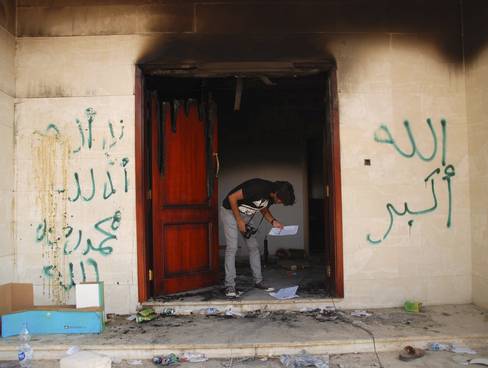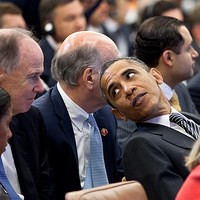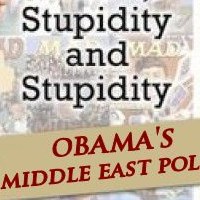![]()
Fri, Jan 25, 2013 | RubinReports | By Barry Rubin

The U.S. consulate in Benghazi, Libya, after an attack that killed U.S. ambassador Chris Stevens and three other Americans. The graffiti reads, “no God but God,” “God is great,” and “Mohammed is the Prophet.” (Ibrahim Alaguri/AP)
Secretary of State Hillary Clinton’s remark, “What difference does it make?” regarding how the motive of the terrorists in the Benghazi, Libya, attack that killed the U.S. ambassador and two CIA men isn’t important — will always be associated with her. She added that the only important thing was to punish those responsible.
Other than a number of obvious points, here are two things that deserve more consideration.
First, the motive of an attack is always important. The Obama administration represented the attack as being in response to an anti-Islam video made by an Egyptian-American. If that were to have been true the implication is that the attack was the fault of America in some way. A change in U.S. behavior — sensitivity, concessions, apologies, changing policies, not identifying revolutionary Islamism as a threat and pretending it is a marginal, deviant movement — is what’s needed.
Critics tend to see the motive as being due to sheer hatred of America or something along those lines. In fact, the motive is somewhat different and extraordinarily important:
— To promote Islamist revolution by hitting at the United States, thus showing America is weak and can be defeated as a way to inspire more to engage in violence and revolutionary activity. You can call this the strategic motive. As an example, at the time of Iran’s Islamist revolution many Iranians feared the United States, seeing in almost superhuman, superpower terms, as eager and able to overthrow any regime in Tehran that was too militant. Thus, the movement should be cautious.
Rejecting this idea, Ayatollah Ruhollah Khomeini wanted to prove that America was weak and could not stop his movement from doing anything it wanted and this is how he portrayed the hostage crisis in the U.S. embassy. A parallel case was that of Usama bin Ladin and the September 11th attack. The message is: Islamism is the movement to back, it is winning victories over the infidels, and can triumph totally.
— To show that terrorism works in injuring the enemy and thus is superior to what others do, including the political maneuvering and mass base building of the Muslim Brotherhood. This can be called the tactical motive. The message is: terrorism is superior to the methods used by other groups so let’s keep doing it and increasing the number of attacks. In this specific case, the United States easily helped overthrow Qadhafi but it is helpless against our willpower, willing to die, and methods.
— To put the focus on hatred of America as a way to gain more support for Islamism as — to use contemporary rhetoric — hatred of the “other.” This can be called the ideological motive. The message is:
Those non-Muslim, non-Arab Americans are the true enemy and any government that is on good terms with them is a traitor.
— To demoralize their relatively more moderate rivals. The message is: Give up, don’t help the Americans. If they won’t protect themselves they certainly won’t save you. That’s why the Libyan government will do little or nothing to help catch those responsible. It is more afraid of the perpetrators than it is of the United States.
These points have been repeatedly stressed by Islamist leaders — Ayman al-Zawahiri comes to mind — in his writings. He and others spoke of how killing fellow Muslims would make the revolutionaries unpopular but killing Israelis or Americans would win them popular backing.
— In this case, a specific motive was to portray the Libyan regime as an American puppet. To overthrow the regime, it is necessary to attack and defeat the United States, making Americans and U.S. influence flee the country. The message is: the Americans cannot save the Libyan government just as they could not protect the shah in Iran or Mubarak in Egypt. Once Syria falls, the Islamists there will pull out Obama, Clinton, and Secretary of State John Kerry quotes to “prove” that President Bashar al-Assad was an American agent and thus everything bad he did can be blamed on Washington.
The Obama Administration wants to bury this analysis because it calls attention to the threat of revolutionary Islamism and, in the last case, to the negative aspects of its own Libya policy. Whether or not that initiative of overthrowing Libyan dictator Muammar Qadhafi was a good idea the fact remains that such a policy has costs. Whether or not unilateral actions and the use of force is a good idea or not in any specific case, standing aside and doing nothing while Americans were killed will also have its costs. Whether or not America has made mistakes in its past policies, apologies and concessions will only persuade the Islamists and a large sector of the local population that the United States is weak, can be defeated, and therefore attacks should be escalated.
Aside from the irrelevance of motive, the other point Clinton made was to emphasize that the most important thing was to punish those responsible. While that sounds impressive, virtually nothing has been done to achieve that goal. In general, of course, the problem is identifying and finding the terrorists, especially if they are located in a country which provides a safe haven to terrorists. The United States never effectively punished, for example, those who attacked the Marine barracks in Beirut in the 1980s
The Libyan case, however, is different. Libya is ruled by a government that is as close to being a U.S. dependent as any Arab government in modern history. There is no sign of serious U.S. pressure on the Libyan regime to do anything. On the contrary, we see that the regime has let suspects go and that those responsible still operate freely within the country.
Again, we are not dealing with terrorists hiding out in places like Iran, Afghanistan, Pakistan, Syria, or Lebanon but rather people going about their daily lives in a country supposedly friendly to the United States.
I believe that more than four months after the killings the administration hasn’t even named a specific group as having carried out the attack or individuals who led the attack. U.S. intelligence cannot possibly be that bad. Well, there is a big problem here, isn’t there? How can the Obama Administration announce that the Libyan attack — and now the large-scale attack on an Algerian oil well where at least one American was killed among several dozen people — was carried out by al-Qaida since it has previously announced that it destroyed that organization. It is possible that politics is getting in the way of the punishment of the perpetrators that Clinton allegedly thirsts for.
Of course, it is embarrassing for the Libyan government to cooperate in going after these terrorists because they are fellow Arabs and Muslims and might seek revenge against that government. But one would think, especially given Secretary of State Clinton’s remarks, that the U.S. priority on getting these individuals would override that political consideration for the Libyan government. It doesn’t.
Remember that it is highly likely — U.S. leaders with access to intelligence know for sure — that high-ranking officials in Pakistan were helping Usama bin Ladin hide despite receiving billions of dollars in U.S. aid. But Libya is an easier case since supposedly the United States has a lot of leverage there.
Remember, too, that it is highly likely that the U.S. leadership let those brave Americans in Libya die because it didn’t want to rush in with military forces and embarrass an incompetent and unwilling to act Libyan government. Indeed, we know for certain that this is why the consulate did not have proper U.S. security protection but — hard as it is to believe — the security was turned over to Islamists who could be reasonably suspected as being anti-American and linked to terrorists. The individuals guarding the consulate had not even received any serious training.
So Clinton’s show of indifference isn’t just a question of distracting attention or callousness, it is a clear symptom of exactly what is wrong with the Obama Administration’s handling of this and other issues. To paraphrase Obama’s own famous remark, Clinton’s statement is a way of claiming in regard to the current crisis in the Middle East that the Islamists “didn’t build that,” a guilty America did. That kind of thinking will lead to a disaster for U.S. interests and the loss of more American lives.
 Barry Rubin is director of the Global Research in International Affairs (GLORIA) Center and editor of the Middle East Review of International Affairs (MERIA) Journal. His latest book, “Israel: An Introduction“, has just been published by Yale University Press. Other recent books include “The Israel-Arab Reader” (seventh edition), “The Long War for Freedom: The Arab Struggle for Democracy in the Middle East” (Wiley), and “The Truth About Syria” (Palgrave-Macmillan). The website of the GLORIA Center and of his blog, Rubin Reports. His original articles are published at PJMedia.
Barry Rubin is director of the Global Research in International Affairs (GLORIA) Center and editor of the Middle East Review of International Affairs (MERIA) Journal. His latest book, “Israel: An Introduction“, has just been published by Yale University Press. Other recent books include “The Israel-Arab Reader” (seventh edition), “The Long War for Freedom: The Arab Struggle for Democracy in the Middle East” (Wiley), and “The Truth About Syria” (Palgrave-Macmillan). The website of the GLORIA Center and of his blog, Rubin Reports. His original articles are published at PJMedia.



 RSS
RSS










Latest Comments
Hello Mike, Thank you for your positive feedback to the article. I felt there wasn’t too much critical analysis of ...
Thanks for this considered and well constructed article. A follow up article on the manner in which the editorial contro...
THE CLUELESSNESS OF CLAIMING THAT OBAMA'S MIDDLE EAST POLICIES WERE A FAILURE CANNOT BE FURTHER FROM THE TRUTH, WHAT THE...
As long as Obama is the president of the usa do not trust the us government......
Thank you for an good read....